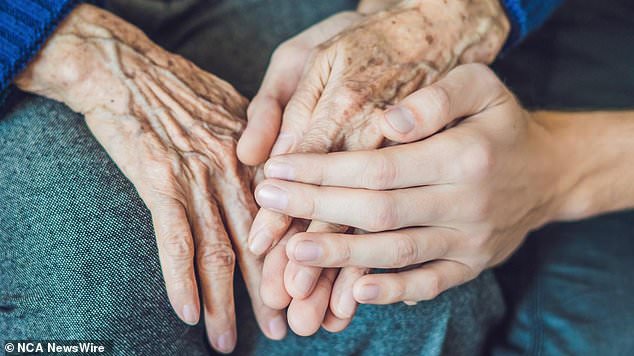Aussie nurse reveals the important lesson that she learned from her dying patients
A Sydney nurse has revealed the important lesson she learned from dying patients after working in palliative care for more than 35 years.
Cindy Grundy, who works at a downtown public hospital, said the most important lesson was to “guard your time” and treat it as a priceless commodity.
‘For me, time is everything. It is so precious,” the 59-year-old said.
‘You have to learn to prioritize and let go of the things that don’t matter. I appreciate the smaller things in life when I work in this job, but time is a big thing for me.”
Ms Grundy’s career has taken her to palliative care settings in wards, nursing homes, prisons and at the bedside of people who chose to spend their final moments at home.
Palliative care nurse Cindy Grundy (pictured) has been working with dying people for 35 years and her most valuable lesson has been to ‘guard your time’

The nurse said a big part of her job is reassuring patients and letting them know that dying doesn’t hurt
At the heart of what she, and other palliative care nurses, do is ensuring patients get the most out of the last few hours, days, weeks or months of their lives – whether that’s by managing their symptoms or fulfilling their last wishes.
“They’re dying, but they’re still alive and that’s an opportunity for laughter, love and new experiences,” explains fellow nurse Steven Turk from Sydney.
He recalled a recent patient, an elderly man, who wanted to interact with animals before his death.
Staff had originally organized for him to visit Taronga Zoo in Sydney’s north; However, due to his declining condition, the trip could not go ahead.
Alternative plans were made for staff to bring in their pets before officers from the NSW Mounted Police Unit offered to bring in two horses to help fulfill the man’s dying wish.
‘The man was confined to the bed, but we had the opportunity to take him downstairs. The mounted police brought two horses and he was able to get that experience,” Mr Turk said.
‘The man was bedridden and dying at the time, but he was aware of the horses and could pet them, and that was the purpose.
‘Even though it didn’t look like the original plan, we still managed to create space for life and you can continue to do that until the end.’
Ms Grundy said it is important for people to know that dying does not hurt.
‘People often ask about pain. They want to know how they will die, and while people are extraordinary, death can often be very ordinary,” she said.
‘Patients often don’t know what to expect and the job involves a lot of talking and reassuring people.’

Mrs. Grundy believes it is a gift to be able to say goodbye when someone knows he or she is dying, as opposed to sudden death
The one question that both Ms. Grundy and Mr. Turk declined to answer is whether nurses were aware of a patient’s shared feelings of regret or last-minute deathbed revelations.
Mr Turk said each patient was unique.
“Some people absolutely embrace the idea of death and it’s actually a point of liberation and it’s something they strive for. Other people, not so much,” he said.
‘Whoever you are in life, you are who you are when you die. You don’t change your personality.’
Ms Grundy added: ‘It’s not like a movie.’
“People feel like they want to tell their family what they mean to them, and if there’s anything positive to take from a life-limiting illness, it’s that you have a unique opportunity to speak your mind,” she said.
“It’s probably the greatest gift you have with that diagnosis. It’s not like sudden death where you don’t have time.’
